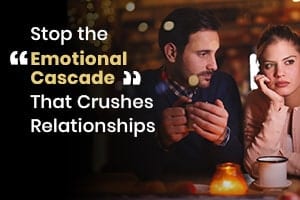It can go downhill so fast.
You’ve met someone you really like, you have a great time with him, and you appreciate the way he shows up on time and treats you like a queen.
Then it starts.
He shows up late.
He says something rude to you and laughs it off.
He blames you for something you didn’t do.
At first you excuse him, because he’s been so wonderful. This is just a blip, you think. He’s having a bad day. This isn’t who he is.
But he keeps on doing it.
Now you’ve got to pretend that it doesn’t hurt, that you don’t care, that you’re bigger than that.
This man, who you thought would make you feel cherished and adored, is now making you feel uncertain and insecure.
What’s going on?
And how can you stop it?
Is It Your Fault?
Your friends may have told you, “You teach him how to treat you.”
They tell you that you’re allowing his bad behavior. That you need to come down on him hard the first time he does it, so he knows he can’t get away with anything.
But you know that if you respond harshly, you could drive him away. He’ll feel criticized and judged. He may not want to come back.
You’re stuck between a rock and a hard place.
You don’t like how he’s treating you, but you don’t want to risk your relationship by making a fuss.
This is such a painful place to be in.
What I want you to know is that you’re not to blame for his behavior.
Your friends are trying to help, but they’re putting the responsibility on you. You didn’t teach him how to treat you. He treated you that way, and now you’re trying to find a way to deal with it.
There are psychological reasons why this pattern is so common.
One is called the emotional cascade.
Once you understand it, you’ll see it everywhere…
And you’ll finally have the power to stop it.
The Emotional Cascade
When you’re having a bad day, you make bad decisions.
You’re more likely to snap at people, cut someone off in traffic, or assume that your coworker’s innocent remark was critical of you.
Whenever we are under the influence of negative emotions—especially if we’re turning it over in our head, becoming even more upset—we tend to act out, which in turn causes people to respond negatively to us, making things even worse.
This emotional cascade happens a lot in relationships.
You’re driving home from work. It’s a blistering hot day, the air conditioning isn’t working, you’re behind at work, you’re worried about visiting your parents this weekend…
And by the time you walk through the door, you’re not in any mood to hear your partner say, “Hey, hon, what’s for dinner?”
Why does he expect you to be responsible for dinner? Isn’t he a grown man? Can’t he feed himself?
Now it’s the next day. You’re driving home from work. You feel fine; it’s been an okay day. You walk through the door, and your guy asks you again, “Hey, hon, what’s for dinner?”
How do you respond?
Do you smile and chat about your meal plans?
Or do you remember how you felt the previous day, when that innocent yet irritating question sparked a wave of fury?
It turns out that the way we respond when we’re caught up in a negative emotion sets the tone for future interactions.
You responded angrily to him yesterday when he asked that question, so now you’re more likely to respond to him angrily again, even though you’re in a better mood.
A small, seemingly inconsequential decision—the decision to react with anger, even though your partner wasn’t the original cause—is now becoming a habit…
And habits are hard to break.
Stop the Cascade
That’s why you want to deal with small things before they get entrenched.
You want to be aware of your moods and how they impact your behavior, so that you can take some space rather than do or say something you’ll regret.
You want to be quick to apologize for behavior that’s out-of-line.
And you want to repair the damage of hurtful words and actions by loading up on the positive.
But you’re only one person.
He needs to do this, too.
So pay attention:
How does he behave when he’s stressed or upset?
Does he take his bad mood out on others? Does he blame you?
Or does he make the effort to calm himself down and take some space?
Does he see when he’s hurting you and regret it? Does he make the effort to heal your connection when it’s been ruptured?
It’s best to notice these clues before you get in too deep.
If he has a pattern of mistreating others under stress, it will take a lot of work for him to change—work he may not be willing to do.
But you can try to raise his awareness by talking to him about the emotional cascade.
Talk about what happens when one of you is in a bad mood.
Talk about how it escalates.
Talk about how you could interrupt the cascade.
Because your friends were right about one thing:
You deserve the best, a relationship filled with love, kindness, and care.


I’m starting to feel like I’m the one these articles are being written *about* instead of who their being written *for*. I signed up for James Bauer because I wanted to get away from “problem men” but I’m also a problem myself. D: I’m a woman, but in this story I relate to the a**hole dude more. By golly gosh I have a lot of work to do…
This emotional cascade thing really helps, though! I’ve had horrible relationships with my family members for these reasons and I didn’t notice!!